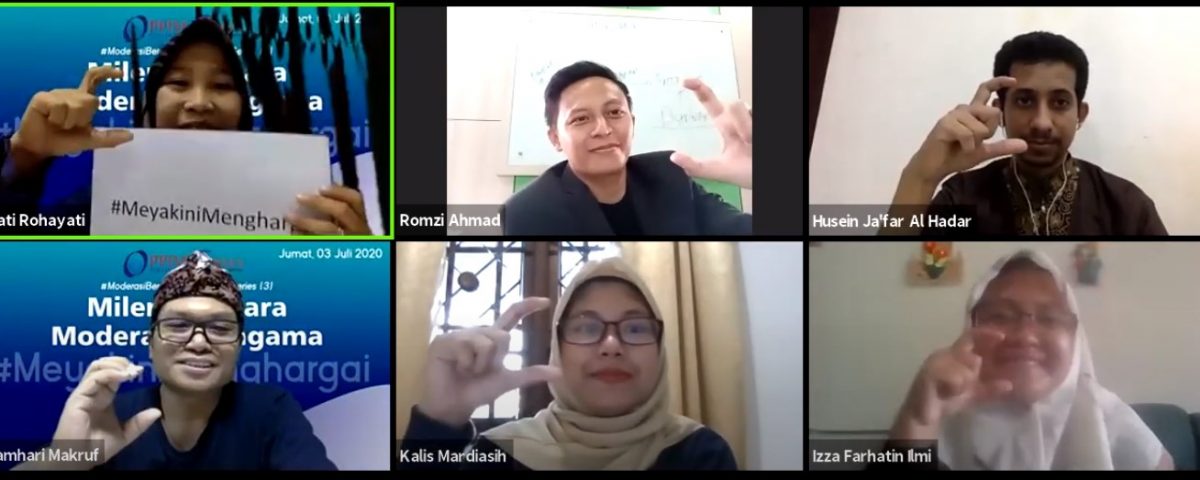Millennials Told to Preach in Social Media

Tim Lindsey: Combine Moderate Islam and Modern Education
July 20, 2020
International Webinar – Takeshi Kohno: Religious Moderation to Thrive, if….
July 20, 2020PPIM.UINJKT.AC.ID – “Generation Z [post-millennials], should take part in dakwah [religious preaching] in social media,” Presidential Special Staff Assistant on Millennials, Romzi Ahmad, said on Friday (3/7) in a virtual seminar series of #ModerasiBeragama (Religious Moderation) themed “Millennials Talking about Religious Moderation”.
The seminar was organized by the Center for the Study of Islam and Society (PPIM) of the Syarif Hidayatullah State Islamic University (UIN) Jakarta through Convey Indonesia program.
Besides Romzi, the seminar that was moderated by Convey Indonesia Team Leader Jamhari Makruf also presented other young Muslim preachers, including Habib Husein Ja’far Al Hadar (a social media preacher known by his Islam Cinta (Loving Islam) concept), Izzah Farhatin Ilmi (a contributor of Bincang Muslimah) and Kalis Mardiasih (a writer and columnist).
Romzi went on to say that in preaching, the millennials should convey it in a millennial way, presenting simple-but-interactive contents about Islam so that those who were new in learning Islam could easily understand the context.
In terms of dakwah, Habib Husein Ja’far Al Hadar divided millennials, who actively preached in social media, into two categories. The first was secular Muslims, who usually came from urban areas and felt disappointed with their religion because they thought it offered no solution for their problems. For them, worshipping was only about respecting the environment. The second category was puritan Muslims, or those who basically had no basic religious knowledge and only followed the trend of hijrah (shifts towards a more religious way of life).
“Both have the same problems: they do not have a deep understanding towards religion. Therefore, it is important to apply tasawuf in preaching,” Habib Husein said. Tasawuf is also known as Sufism. It means the path of Sufis, whose main goal is to follow the sunnah (words and deed) of Prophet Muhammad.
Izzah Farhatin Ilmi agreed with Habib Husein’s opinion. She emphasized that the young preachers should deeply understand the dalil (sources of arguments) of Quran and Hadis when teaching religious moderation. That was crucial because there were a lot of things in Islam that must be explained comprehensively from the perspectives of Islamic law.
“For example, the [Islamic] regulation about saying ‘Merry Christmas’ to our Christian friends. Many of the young generation will not simply accept the doctrine [about whether it is prohibited or allowed]. They always ask what dalil that can support each of the arguments,” Izzah said.
In spreading religious moderation, women’s issues should also be raised in social media. Kalis Mardiasih said it needed more effort to create more opportunities for women to be able to speak up in public and destroy the stigma that “women must be at home and become Al Ummu Madrasatul Ula (the first school for their children)”.
“Women’s issues are still important to be concerned with. I have a lot of female friends who are smart and have the ability to become general practitioners, architects, or scientists. But after they read Islamic literature, which says that women must be at home, they lose expectations about their futures,” Kalis said.
The roles of the young generation in spreading the ideas of religious moderation should become priority. Jamhari cited the latest Indonesian Statistics Agency (BPS) census, which signalled a demographic bonus in 2030-2040. According to the BPS prediction, in that period, out of the total of 297 millions of Indonesia’s population, 64% would be the millennial generation. “Don’t let this demographic bonus be a curse for us all,” said Jamhari, who is also a senior researcher of the PPIM UIN Jakarta.




